Kenwood KRF-V7060D, KRF-V6060D, VR-6050 User Manual

AUDIO VIDEO SURROUND RECEIVER
VR-6050
KRF-V7060D
KRF-V6060D
INSTRUCTION MANUAL
KENWOOD CORPORATION
This instruction manual is for some models. Model availability and features (functions) may differ depending on the country and sales area.
About the supplied remote control
Compared to standard remote controls, the remote control supplied with this receiver has several operation modes. These modes enable the remote control to control other audio/video components. In order to effectively use the remote control it is important to read the operating instructions and obtain a proper understanding of the remote control and how to switch its operation modes (etc.).
Using the remote control without completely understanding its design and how to switch the operation modes may result in incorrect operations.
B60-5192-10 03 MA (K, P, T, M, Y, X) |
0109 |
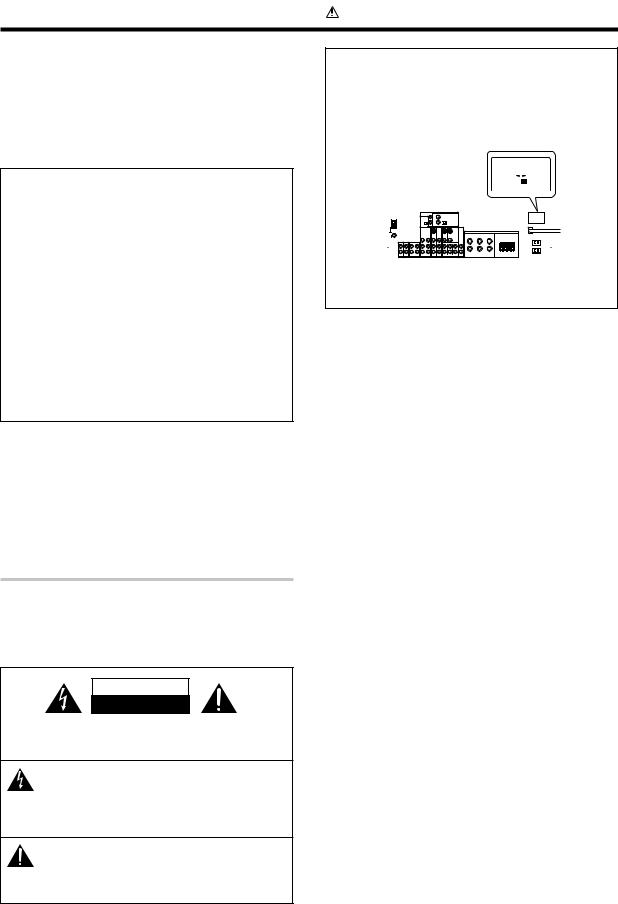
Before applying the power
Caution : Read this page carefully to ensure safe operation.
Units are designed for operation as follows.
U.S.A. and Canada |
........................................... AC 120 V only |
Australia ........................................................... |
AC 240 V only |
Europe and U.K. ............................................... |
AC 230 V only |
China and Russia ............................................. |
AC 220 V only |
Other countries .......... |
AC 110 - 120 / 220 - 240 V switchable* |
For the United Kingdom
Factory fitted moulded mains plug
1.The mains plug contains a fuse. For replacement, use only a 13Amp ASTA-approved (BS1362) fuse.
2.The fuse cover must be refitted when replacing the fuse in the moulded plug.
3.Do not cut off the mains plug from this equipment. If the plug fitted is not suitable for the power points in your home or the cable is too short to reach a power point, then obtain an appropriate safety approved extension lead or adapter, or consult your dealer.
If nonetheless the mains plug is cut off, remove the fuse and dispose of the plug immediately, to avoid a possible shock hazard by inadvertent connection to the mains supply.
IMPORTANT: The wires in the mains lead are coloured in accordance with the following code:
Blue : Neutral
Brown : Live
* AC voltage selection
The AC voltage selector switch on the rear panel is set to the voltage that prevails in the area to which the unit is shipped. Before connecting the power cord to your AC outlet, make sure that the setting position of this switch matches your line voltage. If not, it must be set to your voltage in accordance with the following direction.
AC voltage selector switch
Move switch lever to |
VOLTAGE SELECTOR |
||||||||
120V~ |
|
|
|
240V~ |
|||||
|
|
AC 110- |
|
|
|
AC 220- |
|||
match your line voltage |
|
|
|
|
|
|
|
|
|
with a small screwdriver |
|
|
|
|
|
|
|
|
|
or other pointed tool. |
|
|
|
|
|
|
|
|
|
|
|
|
|
|
|
|
|
|
|
|
|
|
|
|
|
|
|
|
|
|
|
|
|
|
|
|
|
|
|
Note:
Our warranty does not cover damage caused by excessive line voltage due to improper setting of the AC voltage selector switch.
Do not connect those leads to the earth terminal of a three-pin plug.
Safety precautions
WARNING :
TO PREVENT FIRE OR ELECTRIC SHOCK, DO NOT EXPOSE THIS APPLIANCE TO RAIN OR MOISTURE.
CAUTION
RISK OF ELECTRIC SHOCK
DO NOT OPEN
CAUTION: TO REDUCE THE RISK OF ELECTRIC SHOCK, DO NOT REMOVE COVER (OR BACK). NO USER-SERVICEABLE PARTS INSIDE. REFER SERVICING TO QUALIFIED SERVICE PERSONNEL.
THE LIGHTNING FLASH WITH ARROWHEAD SYMBOL, WITHIN AN EQUILATERAL TRIANGLE, IS INTENDED TO ALERT THE USER TO THE PRESENCE OF UNINSULATED “DANGEROUS VOLTAGE” WITHIN THE PRODUCT’S ENCLOSURE THAT MAY BE OF SUFFICIENT MAGNITUDE TO CONSTITUTE A RISK OF ELECTRIC SHOCK TO PERSONS.
THE EXCLAMATION POINT WITHIN AN EQUILATERAL TRIANGLE IS INTENDED TO ALERT THE USER TO THE PRESENCE OF IMPORTANT OPERATING AND MAINTENANCE (SERVICING) INSTRUCTIONS IN THE LITERATURE ACCOMPANYING THE APPLIANCE.
2 EN
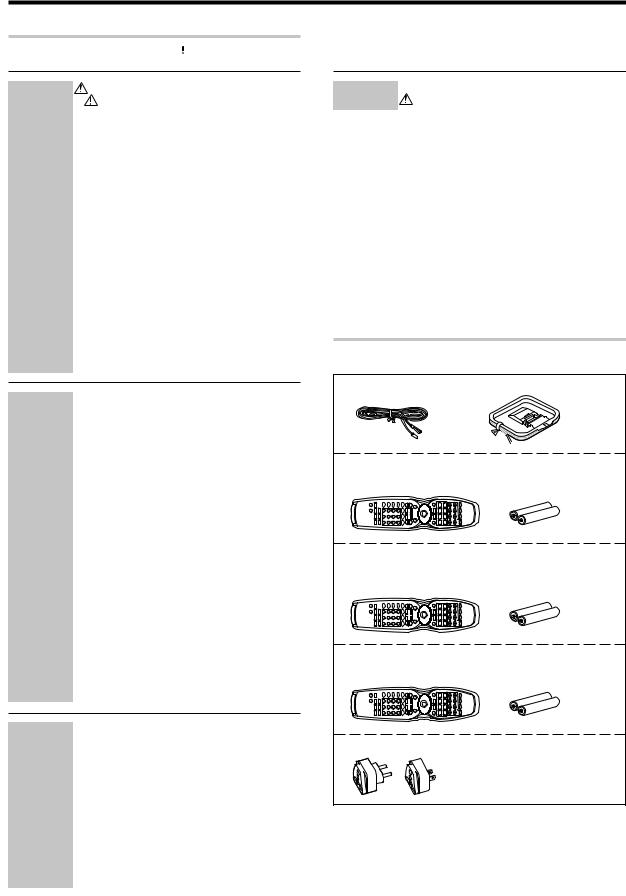
Before applying the power
Contents
Caution : Read the pages marked  carefully to ensure safe operation.
carefully to ensure safe operation.
Before applying the power .............................. |
2 |
Safety precautions ............................................. |
2 |
Unpacking .......................................................... |
3 |
How to use this manual ..................................... |
4 |
Special features ................................................. |
5 |
Names and functions of parts ......................... |
6 |
Main Unit ........................................................... |
6 |
Remote control unit (RC-R0725) (KRF-V7060D)
and (RC-R0727) (VR-6050/KRF-V6060D) ............... |
7 |
Remote control unit (RC-R0726) (KRF-V6060D)
|
(For the U.K. only) .................................................. |
8 |
|
Setting up the system ........................................ |
9 |
Preparations |
|
|
|
Connecting audio components ........................ |
10 |
|
Connecting video components ........................ |
11 |
|
Digital connections .......................................... |
12 |
|
Connecting a DVD player (6-channel input) ..... |
13 |
|
Connecting the speakers ................................. |
14 |
|
Connecting the terminals ................................ |
15 |
|
Connecting to the AV AUX jacks ..................... |
16 |
|
Connecting the antennas ................................. |
16 |
|
Connecting the system control ....................... |
17 |
|
Preparing the remote control .......................... |
17 |
|
Preparing for surround sound ....................... |
18 |
|
Speaker settings .............................................. |
18 |
|
Normal playback .............................................. |
21 |
|
Preparing for playback ..................................... |
21 |
|
Listening to a source component .................... |
21 |
|
Adjusting the sound ......................................... |
22 |
|
Recording .......................................................... |
23 |
|
Recording audio (analog sources) ................... |
23 |
|
Recording video ............................................... |
23 |
|
Recording audio (digital sources) .................... |
23 |
|
Listening to radio broadcasts ....................... |
24 |
|
Tuning (non-RDS) radio stations ...................... |
24 |
|
Using RDS (Radio Data System) |
|
|
(For the U.K. only) ............................................ |
24 |
|
Presetting radio stations manually .................. |
24 |
Operations |
|
|
|
Receiving preset stations ................................ |
25 |
|
Receiving preset stations in order (P.CALL) ... |
25 |
|
Using the RDS DISP (Display) key |
|
|
(For the U.K. only) ................................................. |
25 |
|
Presetting RDS stations (RDS AUTO MEMORY) |
|
|
(For the U.K. only) .............................................. |
26 |
|
Tuning by Program TYpe (PTY search) |
|
|
(For the U.K. only) ............................................ |
26 |
|
Ambience effects ............................................. |
27 |
|
Surround modes .............................................. |
27 |
|
Surround play ................................................... |
29 |
|
DVD 6-channel playback .................................. |
30 |
|
Convenient functions ....................................... |
30 |
|
Basic remote control operations for other |
|
|
components ....................................................... |
33 |
|
Registering setup codes for other |
|
|
components ..................................................... |
33 |
|
Operating other components .......................... |
34 |
|
Setup code chart |
|
Remote Control |
(RC-R0727) (VR-6050/KRF-V6060D) |
|
|
(RC-R0725) (KRF-V7060D) ............................... |
35 |
|
Setup code chart |
|
|
(RC-R0726) (KRF-V6060D) |
|
|
(For the U.K. only) ............................................ |
36 |
|
CASSETTE deck, CD player & MD recorder |
|
|
operations ........................................................ |
37 |
|
Other components’ operations ....................... |
38 |
Additional |
In case of difficulty .......................................... |
40 |
Information |
Specifications .................................................. |
42 |
Unpacking
Unpack the unit carefully and make sure that all accessories are present.
FM indoor antenna (1) |
AM loop antenna (1) |
For VR-6050/KRF-V6060D |
|
Remote control unit (1) |
Batteries (R6/AA) (2) |
RC-R0727 |
|
For KRF-V6060D (For the U.K. only)
Remote control unit (1) |
Batteries (R6/AA) (2) |
RC-R0726 |
|
For KRF-V7060D |
|
Remote control unit (1) |
Batteries (R6/AA) (2) |
RC-R0725 |
|
*AC plug adaptor (2)
*Use to adapt the plug on the power cord to the shape of the wall outlet. (Accessory only for regions where use is necessary.)
If any acccessories are missing, or if the unit is damaged or fails to operate, notify your dealer immediately. If the unit was shipped to you directly, notify your shipper immediately. Kenwood recommends that you retain the original carton and packing materials in case you need to move or ship the unit in the future.
Keep this manual handy for future reference.
3 EN
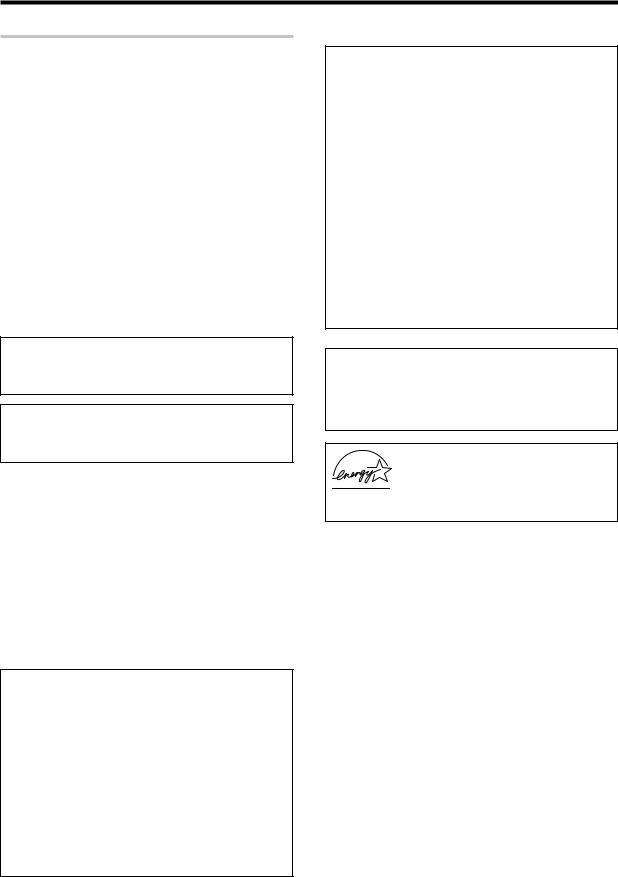
Before applying the power
How to use this manual
This manual is divided into four sections, Preparations, Operations, Remote Control, and Additional Information.
Preparations
Shows you how to connect your audio and video components to the receiver and prepare the surround processor.
Since this receiver works with all your audio and video components, we will guide you in setting up your system to be as easy as possible.
Operations
Shows you how to operate the various functions available on the receiver.
Remote Control
Shows you how to operate other components using the remote control, as well as a detailed explanation of all remote control operations. Once you have registered your components with the proper setup codes, you’ll be able to operate both this receiver and your other AV components (TV, VCR, DVD player, CD player, etc.) using the remote control supplied with this receiver.
Additional Information
Shows you additional information such as “In case of difficulty” (troubleshooting) and “Specifications”.
For the U.S.A.
FCC WARNING
This equipment may generate or use radio frequency energy. Changes or modifications to this equipment may cause harmful interference unless the modifications are expressly approved in the instruction manual. The user could lose the authority to operate this equipment if an unauthorized change or modification is made.
NOTE:
This equipment has been tested and found to comply with the limits for a Class B digital device, pursuant to Part 15 of the FCC Rules. These limits are designed to provide reasonable protection against harmful interference in a residential installation. This equipment may cause harmful interference to radio communications, if it is not installed and used in accordance with the instructions. However, there is no guarantee that interference will not occur in a particular installation. If this equipment does cause harmful interference to radio or television reception, which can be determined by turning the equipment off and on, the user is encouraged to try to correct the interference by one or more of the following measures:
–– Reorient or relocate the receiving antenna.
–– Increase the separation between the equipment and receiver.
–– Connect the equipment into an outlet on a circuit different from that to which the receiver is connected.
–– Consult the dealer or an experienced radio / TV technician for help.
Maintenance of the unit
When the front panel or case becomes dirty, wipe with a soft, dry cloth. Do not use thinner, benzine, alcohol, etc. for these agents may cause discoloration.
In regard to contact cleaner
Do not use contact cleaners because it could cause a malfunction. Be specially careful not to use contact cleaners containing oil, for they may deform the plastic component.
Memory back up function
Please note that the following items will be deleted from the unit's memory if the power cord is disconnected from the AC outlet for approximately 1 day.
• Power mode. |
• Distance setting. |
• Input selector settings. |
• Input mode setting. |
• Picture output. |
• Midnight mode setting. |
• Speaker ON/OFF. |
• PRO LOGIC II mode setting. |
• Volume level. |
• CS II mode setting. |
• BASS, TREBLE, INPUT level. |
• Broadcast band. |
• TONE ON/OFF. |
• Frequency setting. |
• LOUDNESS ON/OFF. |
• Preset stations. |
• Dimmer level. |
• Tuning mode. |
• MD/TAPE settings. |
• DSP mode. |
• Listen mode setting. |
• ACTIVE EQ mode. |
• Speaker settings. |
• SPEAKER EQ mode. |
• SW RE-MIX ON/OFF. |
|
For the U.S.A.
Note to CATV system installer
This reminder is provided to call the CATV system installer's attention to Article 820-40 of the NEC that provides guidelines for proper grounding and, in particular, specifies that the cable ground shall be connected to the grounding system of the building, as close to the point of cable entry as practical.
As an ENERGY STAR® Partner, Kenwood Corporation has determined that this product meets the ENERGY STAR® guidelines for energy efficiency. This product can save energy. Saving energy re-
duces air pollution and lowers utility bills.
4 EN
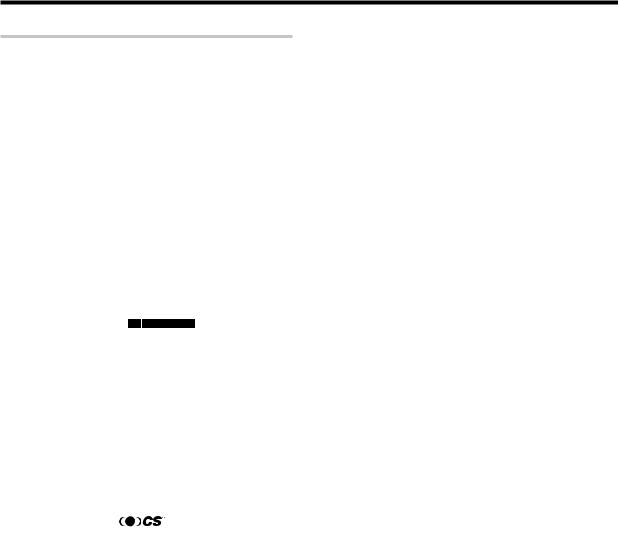
Before applying the power
Special features
True home theater sound
This receiver incorporates a wide variety of surround modes to bring you maximum enjoyment from your video software. Select a surround mode according to your equipment or the software you are going to play and enjoy! ¶
DSP surround modes
The DSP (Digital Signal Processor) used for this receiver incorporates a variety of high quality adjustable sound fields, like “ARENA”, “JAZZ CLUB”, “THEATER”, “STADIUM” and “DISCO”. It is compatible with almost any kind of program source.
Dolby Digital and Dolby Digital EX
The DOLBY DIGITAL mode lets you enjoy full digital surround from software processed in the Dolby Digital format. Dolby Digital provides up to 5.1 channels of independent digital audio for better sound quality and more powerful presence than conventional Dolby Surround.
As for Dolby Digital EX, it creates six full-bandwidth output channels from the 5.1 channel sources. This is done using a matrix decoder that derives three surround channels from the two in the original recording. For best results, Dolby Digital EX should be used with movie soundtracks recorded with Dolby Digital Surround EX.
Dolby PRO LOGIC II
Dolby PRO LOGIC II, whilst totally compatible with its predecessor PRO LOGIC, provides greater advantages in surround sound. It allows the user to enjoy the conventional stereo or Dolby Surround with a convincing “5.1 like” presentation. PRO LOGIC II offers special features for controlling the overall spatial, dimensionality and frontal sound field imaging. PRO LOGIC II produces an impressive surround sound from video software marked and three-dimensional space from music CD. When listening to music, you will be able to enjoy the experience of sheer STEREO surround sound.
DTS
DTS (Digital Theater System) is a 5.1 channel digital audio format that provides five full-spectrum channels and one low-frequency (subwoofer) channel for unprecedented clarity, optimum channel separation and a (wide) dynamic range.
In the DTS mode, the 5.1 channel digital input from a DTS CD, LD or DVD disc (carrying the “DTS” marking) can be played in Digital Surround.
Important:
When a DTS disc is played on a CD, LD or DVD player, noise may be output from the analog output. It is recommended that you connect the digital output of the player to the digital input of this unit.
DVD 6-channel input
If you own a DVD player equipped with 6-channel output, this receiver allows you to obtain the full surround sound impact of DVD source material featuring multi-channel encoding. Since the source signals are digital and each channel is input independently, the resulting ambience is far superior to what can be achieved with conventional surround sound systems.
ACTIVE EQ
ACTIVE EQ mode will produce a more dynamic sound quality in any condition. You can enjoy a more impressive sound effect when ACTIVE EQ is turned on during Dolby Digital and DTS playback.
SPEAKER EQ
The SPEAKER EQ function will automatically detect the various features of each speaker and effectively creates a stereoscopic sound effect.
Universal IR (InfraRed) remote control
In addition to the basic receiver, the remote control supplied with this receiver can also operate almost all of your remote controllable audio and video components. Just follow the simple setup procedure to register the components you have connected.
RDS (Radio Data System) tuner (For the U.K. only)
The receiver is equipped with an RDS tuner that provides several convenient tuning functions: RDS Auto Memory, to automatically preset up to 40 RDS stations broadcasting different programs; station name display, to show you the name of the current broadcast station; and PTY search to let you tune stations by program type.
PTY (Program TYpe) search (For the U.K. only)
Tune the stations by specifying the type of program you want to hear.
Multi channel surround sound |
) |
(SRS Circle Surround II |
SRS Circle Surround II ™ improves on its predecessor CS-5.1™ resulting in the CS-6.1™ system, enabling you to listen to realistic, multichannel, surround sound playback from a stereo source or conventional surround-encoded video source. You already enjoy listening to Dolby digital sound/DTS multi-channel sound with your multi-speakers. Now you can listen to audio CDs, MDs, Broadcast and Home Theater using your multi-speakers. You will discover a new type of sound through SRS Circle Surround II .
5 EN
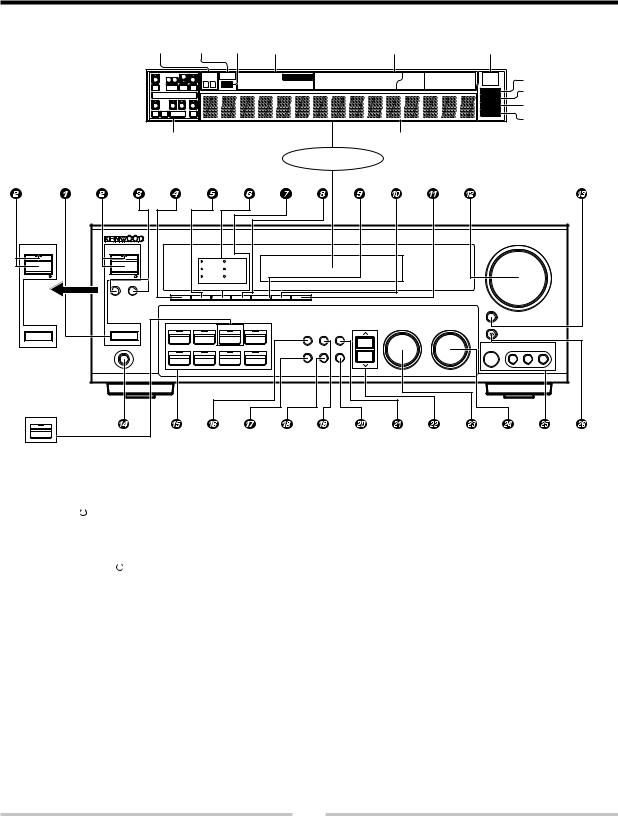
Names and functions of parts
Main unit
Speaker MUTE |
CLIP |
Input mode |
Listen mode |
|
indicators indicator |
indicator |
indicators |
indicators |
RDS indicators |
|
|
|
|
|
SP |
MUTE |
OPTICAL 6CH INPUT |
AUTO DETECT |
|
DTS DOLBY DIGITAL STEREO |
RDS |
AUTO indicator |
|
|
|
|
|
A B |
CLIP |
COAXIAL ANALOG |
96kHzfs |
DSP MODE |
PRO LOGIC LOUDNESS |
PTY |
|
L |
|
C |
SW |
R |
CSII |
MEMORY indicator |
||||||
|
|
|
|
|
|
|
AUTO |
|||||
|
|
LFE |
|
|
|
|
|
|
|
|
||
|
|
|
|
|
|
|
|
|
|
MEMORY |
|
|
|
|
|
|
|
|
|
|
|
|
|
STEREO indicator |
|
|
|
|
|
|
|
|
|
|
|
|
STEREO |
|
SL |
S |
SB |
|
SR |
|
|
|
|
|
|
TUNED |
TUNED indicator |
|
|
|
|
|
|
|
|
|
|
|
|
Speaker selection indicators |
|
Frequency display |
Input channel indicators |
|
Input display |
Output channel indicators |
Display |
Preset channel display |
|
|
Surround mode display |
|
|
|
|
|
|
|
|
|
|
|
|
|
VOLUME CONTROL |
|
POWER |
|
|
|
|
|
|
|
|
|
|
|
|
|
|
STANDBY |
STANDBY |
|
|
|
|
|
|
|
|
|
|
|
|
|
|
|
|
DSP |
|
DOLBY DIGITAL |
|
|
|
|
|
|
|
|
|
|
|
|
SPEAKER EQ |
DTS |
|
|
|
|
|
|
|
|
|
|
ON/STANDBY |
ON/STANDBY |
|
ACTIVE EQ |
CSII |
|
|
|
|
|
|
|
|
|
|
|
A SPEAKERS B |
LOUDNESS |
SPEAKEREQ |
ACTIVEEQ |
DSP |
STEREO |
INPUT MODE |
DIMMER |
|
|
|
|
|
|
|
|
|
|
|
|
|
||||||||
|
|
|
|
|
|
|
|
|
|
|
|
DOWN |
|
UP |
|
|
|
|
|
|
|
|
|
|
|
|
|
MUTE |
|
|
POWER |
DVD/6CH |
CD/DVD |
|
AUX |
|
TUNER |
|
|
|
MULTI CONTROL |
LISTEN MODE |
|
|
|
|
|
|
|
|
|
|
|
|
|||||
F ULL DIGITA L |
|
|
|
|
|
|
|
|
SOUND |
TONE |
SETUP |
|
AV AUX |
|
D E C O D I N G |
|
|
|
|
|
|
|
|
|
|
|
|
|
|
|
-ON –OFF |
|
|
|
|
|
|
|
|
|
|
S VIDEO |
VIDEO |
L-AUDIO-R |
|
PHONES |
VIDEO 1 |
VIDEO 2 |
|
VIDEO 3 |
MD/TAPE |
|
BAND |
AUTO MEMORY |
|||||
|
|
|
|
|
|
|||||||||
For VR-6050 |
|
|
|
|
|
|
|
|
|
|
|
|||
|
|
|
|
|
|
|
|
|
|
|
|
|
|
|
PHONO |
|
|
|
|
|
|
|
|
|
|
|
|
|
|
For KRF-V7060D and
KRF-V6060D (For the U.K. only)
1 POWER ON/OFF key |
|
DTS indicator |
ª |
^ SOUND key |
º |
||||
(For KRF-V7060D/V6060D) |
* |
Lights when the receiver is in the DTS mode. |
Use to adjust the sound quality and the ambi- |
||||||
Use to turn the main power ON/OFF. |
|
CS II indicator |
ª |
ence effects. |
|
||||
2 ON/STANDBY |
|
key |
|
Lights when the receiver is in the CIRCLE |
& BAND key |
¢ |
|||
|
|
||||||||
(For KRF-V7060D/V6060D) |
* |
SURROUND II mode. |
|
Use to select the broadcast band. |
|||||
Use to turn the power ON/STANDBY when |
7 ACTIVE EQ key |
™ |
* AUTO key |
¢ |
|||||
the POWER is turned ON. |
|
Use to select ACTIVE EQ’s setting. |
|
Use to select the auto or manual tuning |
|||||
STANDBY indicator |
|
8 DSP key |
ª |
mode. |
|
||||
2 POWER ON/STANDBY |
|
key |
|
Use to select any of the DSP mode. |
|
( TONE key |
™ |
||
|
|
|
|||||||
(For VR-6050) |
* |
9 STEREO key |
º |
Use to switch the status of TONE control. |
|||||
Use to turn the power ON/STANDBY. |
|
Use to switch the listen mode to STEREO. |
) MEMORY key |
¢§ |
|||||
STANDBY indicator |
|
0 INPUT MODE key |
9 |
Use to store radio stations in the preset |
|||||
3 A SPEAKERS B keys |
¡ |
Use to switch between the full auto, digital |
memory and to start the Auto Memory (for |
||||||
Use to turn the A/B speakers ON/OFF. |
and analog inputs. |
|
the U.K. only). |
|
|||||
4 LOUDNESS key |
™ |
! DIMMER key |
|
¡ SETUP key |
* |
||||
Use to switch the status of LOUDNESS. |
Use to select the REC MODE. |
£ |
Use to select the speakers' settings etc. |
||||||
5 SPEAKER EQ key |
™ |
Use to adjust the brightness of the display. |
™ M/? keys |
* |
|||||
Use to select SPEAKER EQ’s setting. |
|
|
¤ |
Use for selection adjustments during SOUND, |
|||||
6 Surround indicators |
|
@ VOLUME CONTROL knob |
¡ |
SETUP and PRESET CHANNEL functions. |
|||||
DSP indicator |
ª |
# MUTE key |
™ |
£ MULTI CONTROL knob |
* |
||||
Lights when the receiver is in the DSP mode. |
Use to temporarily mute the sound. |
|
Use to control a variety of settings. |
||||||
SPEAKER EQ indicator |
™ |
$ PHONES jack |
™ |
¢ LISTEN MODE knob |
ª |
||||
Lights when the receiver is in the SPEAKER |
Use for headphone listening. |
|
Use to select the listening mode. |
|
|||||
EQ mode. |
|
% Input Selector keys |
¡ |
∞ AV AUX (S VIDEO, VIDEO, L-AUDIO-R) |
|||||
ACTIVE EQ indicator |
™ |
DVD/6CH, CD/DVD, AUX (for VR-6050/KRF- |
jacks |
^ |
|||||
Lights when the receiver is in the ACTIVE EQ |
V6060D) or PHONO [for KRF-V7060D and |
§ AV AUX key |
^ |
||||||
mode. |
|
KRF-V6060D (for the U.K. only)], TUNER, |
Use to switch the input to AV AUX. |
||||||
DOLBY DIGITAL indicator |
ª |
VIDEO 1, VIDEO 2, VIDEO 3, MD/TAPE |
|
|
|||||
Lights when the receiver is in the Dolby |
Use to select input sources. |
|
|
|
|||||
Digital mode. |
|
|
|
|
|
||||
Standby mode
While the standby indicator is lit, a small amount of power is supplied to the system to back up the memory. This is called standby mode. Under the condition, the system can be turned ON by remote control unit.
Connection at POWER ON/OFF key (for KRF-V7060D/V6060D)
The power in this equipment will not be completely cut off from the AC wall outlet when the main switch is turned OFF.
6 EN
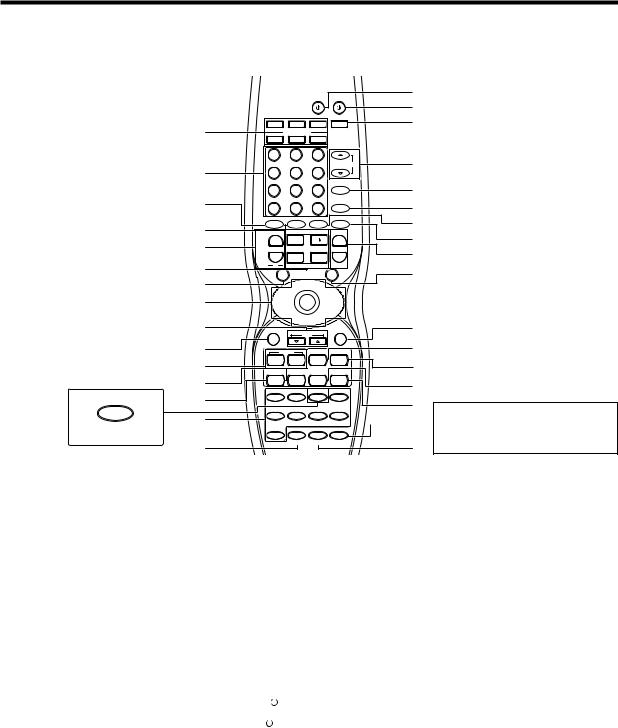
Names and functions of parts
Remote control unit (RC-R0725) (KRF-V7060D) and (RC-R0727) (VR-6050/KRF-V6060D)
This remote control unit can be use not only for Kenwood products but also for other non-Kenwood products by setting the appropriate manufacturer’s setup codes. fi
|
1 |
|
2 |
|
3 |
|
4 |
|
5 |
|
6 |
|
7 |
|
8 |
|
9 |
|
0 |
|
! |
|
@ |
PHONO |
# |
|
$ |
For RC-R0725 only
%
|
|
SOURCE |
POWER |
DVD |
CBL |
DSS/SAT |
RECEIVER |
|
REMOTE MODE |
|
|
VCR |
TV |
OTHERS |
|
1 |
2 |
3 |
|
|
|
|
LISTEN MODE |
4 |
5 |
6 |
|
7 |
8 |
9 |
ACTIVE EQ |
|
|||
|
0 |
|
SPEAKER EQ |
+10 |
+100 |
|
|
INPUT MODE STEREO |
DSP MODE |
MUTE |
|
|
+ |
TV CONTROL |
+ |
|
¢ |
+ |
|
||
DVD |
|
VOL. |
|
|
|
|
|
|
|
4 |
- |
- |
INPUT |
- |
|
||||
|
|
|
SEL |
|
|
CH |
|
|
VOLUME |
|
|
TOP MENU |
MENU |
|
|
|
SET UP |
SOUND |
|
™ |
P.CALL |
P.CALL |
4 /DOWN |
/UP ¢ |
™ENTER £
MULTI |
|
|
|
CONTROL |
™ |
|
|
|
|
|
|
OSD |
PAGE |
RETURN |
|
|
|
||
TUNING |
FLIP |
BAND |
|
1 |
¡ |
2 |
6 |
INPUT SEL |
A/B |
AUTO |
8 |
DISC SEL |
DISC SKIP |
7 |
DIMMER |
DVD/6CH |
CD/DVD |
AUX |
TUNER |
VIDEO 1 |
VIDEO 2 |
VIDEO 3 |
MD/TAPE |
|
INPUT SELECTOR |
|
|
AV AUX |
|
|
|
|
LOUDNESS |
TONE |
BASS BOOST |
^
&
*
(
)
¡
™
£
¢
∞
§
¶
•
ª
ºIf the name of a function is different on
 ⁄ the receiver and on the remote control, the name of the remote control key in
⁄ the receiver and on the remote control, the name of the remote control key in
¤this manual is indicated in parentheses.
1 REMOTE MODE keys (DVD, CBL, DSS/ |
! TUNING 1/¡ keys |
¢ ¢ VOLUME +/- keys |
¡ |
||||||
SAT, VCR, TV, OTHERS) |
‹ |
Use to operate the tuner mode. |
|
Use to adjust the receiver volume. |
|
||||
Use to select the components registered at |
If CD, MD or TAPE is selected as the input |
∞ MENU key |
|
||||||
the respective input. |
|
source, these keys function as search keys. |
Use to operate other components. |
|
|||||
2 Numeric keys |
‹ @ DISC SKIP key |
|
SOUND key |
º |
|||||
Provide functions identical to those of the |
If CD is selected as the input source, this key |
Use to adjust the sound quality and the ambi- |
|||||||
original remote control supplied with the com- |
functions as the multi-CD player disc skip |
ence effects. |
|
||||||
ponent you are controlling. |
|
key. |
|
|
|
§ RETURN key |
|
||
3 INPUT MODE key |
9 |
A/B key |
|
|
|
Use to operate other components. |
|
||
Use to switch between the full auto, digital |
If TAPE is selected as the input source, this is |
¶ 2 key |
|
||||||
and analog inputs. |
|
A and B deck of a double cassette deck. |
Use to operate other components. |
|
|||||
4 STEREO key |
º # DISC SEL key |
|
FLIP key |
|
|||||
Use to switch the listen mode to STEREO. |
Use to operate other components. |
|
Use to operate other components. |
|
|||||
5 CH +/- keys |
|
INPUT SEL key |
|
• 3/8 key |
|
||||
Use to select the channels. |
|
Use to operate other components. |
|
If CD is selected as the input source, this key |
|||||
¢ DVD 4 keys |
|
$ INPUT SELECTOR keys [DVD/6CH, CD/ |
functions as the play/pause key. |
|
|||||
When in DVD player operations, these keys |
DVD, AUX or PHONO (for RC-R0725 only), |
If MD or TAPE key is selected as input source, |
|||||||
function as skip keys. |
|
TUNER, VIDEO 1, VIDEO 2, VIDEO 3, MD/ |
this key functions as the play key. |
|
|||||
6 TV CONTROL keys |
|
TAPE, AV AUX] |
|
BAND key |
¢ |
||||
Use when in TV operation. |
|
Use to select the input sources. |
¡ |
Use to select the broadcast band. |
|
||||
7 TOP MENU key |
|
% LOUDNESS key |
™ ª 7 key |
|
|||||
Use to operate the DVD component. |
|
Use to switch the status of LOUDNESS. |
If CD, MD, or TAPE is selected as the input |
||||||
SET UP key |
* ^ SOURCE ( |
|
) key |
|
source, this key functions as the stop key. |
||||
|
|
||||||||
Use to select the speakers’ settings etc. |
Use to turn the other components ON/OFF. |
AUTO key |
¢ |
||||||
8 Joystick |
|
& POWER ( |
|
|
|
) key |
* |
Use to select the auto or manual tuning |
|
|
|
|
|||||||
ENTER |
|
Use to turn the receiver ON/OFF. |
|
mode. |
|
||||
Use to operate other components. |
|
* RECEIVER key |
|
º DIMMER key |
¤ |
||||
MULTI CONTROL C/D |
* |
Use to return to the operation of the receiver. |
Use to adjust the brightness of the display. |
||||||
Use to control a variety of settings. |
|
( LISTEN MODE %/fi keys |
ª |
8 key |
|
||||
Use to operate other components. |
|
Use to select the listening mode. |
|
Use to operate other components. |
|
||||
P.CALL 4/DOWN 2and P.CALL/UP ¢ |
) ACTIVE EQ key |
™ ⁄ BASS BOOST key |
™ |
||||||
3 |
∞ |
Use to select ACTIVE EQ’s setting. |
|
Use to select the maximum adjustment set- |
|||||
Use for selection adjustments during SOUND, |
¡ SPEAKER EQ key |
™ |
ting for the low frequency range. |
|
|||||
SET UP and PRESET channel functions. |
Use to select SPEAKER EQ’s setting. |
|
¤ TONE key |
™ |
|||||
9 PAGE %/fi keys |
|
™ DSP MODE key |
ª |
Use to switch the status of TONE control. |
|||||
Use to operate the DVD component. |
|
Use to select any of the DSP mode. |
|
|
|
||||
0 OSD key |
|
£ MUTE key |
|
|
™ |
|
|
||
Use to operate the DVD component. |
|
Use to temporarily mute the sound. |
|
|
|
||||
7 EN
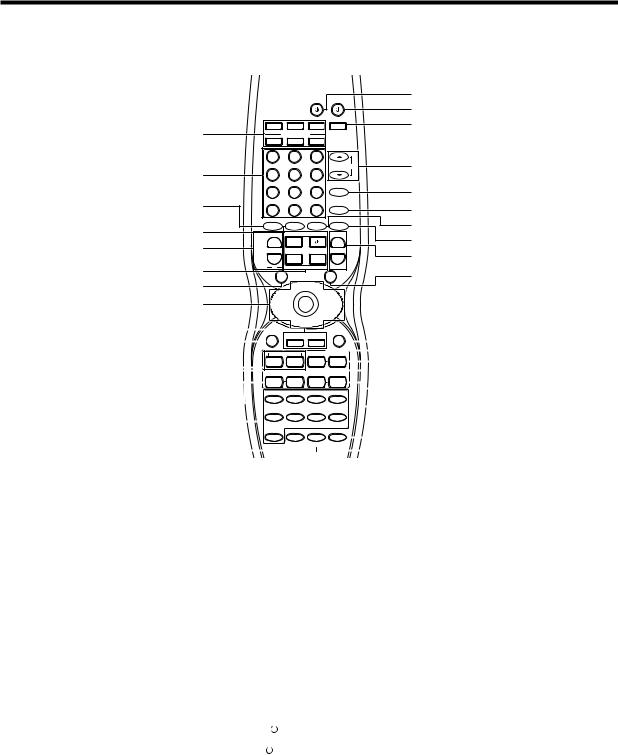
Names and functions of parts |
|
|
|
|
|
|
|
|
Remote control unit (RC-R0726) (KRF-V6060D) (For the U.K. only) |
|
|||||||
This remote control unit can be used not only for Kenwood products but also for other non-Kenwood products by setting the appropriate manufacturer’s |
||||||||
setup codes. |
|
|
|
|
|
|
|
fl |
|
|
|
|
|
SOURCE |
POWER |
^ |
|
|
|
|
|
|
|
|||
|
|
|
|
|
|
|
|
& |
1 |
|
DVD |
|
CD |
CBL/SAT |
|
RECEIVER |
* |
|
|
REMOTE MODE |
|
|
|
|||
|
|
VCR |
|
TV |
OTHERS |
|
|
|
|
|
1 |
|
2 |
3 |
|
|
( |
|
|
|
|
|
|
|
LISTEN MODE |
|
|
|
|
|
|
|
|
|
|
2 |
|
4 |
|
5 |
6 |
|
|
|
|
|
7 |
|
8 |
9 |
|
ACTIVE EQ |
) |
3 |
|
|
|
|
||||
|
|
|
0 |
|
|
SPEAKER EQ |
¡ |
|
|
|
+10 |
|
+100 |
|
|
||
|
INPUT MODE STEREO DSP MODE |
MUTE |
™ |
|||||
4 |
|
|
|
|
|
|
|
|
|
+ |
|
TV CONTROL |
|
+ |
£ |
||
|
¢ |
|
+ |
|
|
|||
5 |
DVD |
|
|
VOL. |
|
|
|
¢ |
|
4 |
- |
|
- |
INPUT |
|
- |
|
|
|
|
|
|||||
|
|
|
|
|
SEL |
|
|
|
6 |
|
CH |
|
|
|
|
VOLUME |
|
|
|
|
TOP MENU |
MENU |
|
|
∞ |
|
7 |
|
|
|
SET UP |
SOUND |
|
|
|
|
|
|
™ |
|
|
|
|
|
|
|
|
P.CALL |
P.CALL |
|
|||
8 |
|
4 /DOWN |
/UP ¢ |
|
||||
|
|
™ |
ENTER |
£ |
|
|
||
|
|
|
|
|
||||
|
|
|
|
|
|
|
|
|
MULTI |
|
|
|
|
|
|
|
|
|
|
|
|
|
|||||
|
|
|
|
|
|
|
|
|
CONTROL |
|
|
|
|
|
|
|
|
|
|
|
|
|
|||||
|
|
|
|
|
|
|
|
|
|
|
|
|
™ |
|
|
|
|
|
|
|
|
|
|
|
|
|
|
|
9 |
|
|
|
|
|
|
|
|
|
|
|
|
|
|
|
|
|
|
§ |
|
|
|
||||
|
|
|
|
|
|
OSD |
PAGE DOWN |
PAGE UP |
RETURN |
|
|
|
|
|
|||||||||||||
|
|
|
|
|
|
|
|
|
|
|
|
|
|
|
|
|
|
|
|
|
|||||||
|
0 |
|
|
|
|
|
|
|
|
PTY |
RDS DISP |
|
|
|
|
|
|
¶ |
|
|
|
||||||
|
|
|
|
|
|
|
|
|
|
|
|
|
|
|
|
|
|
|
|
|
|
|
|
|
|||
|
|
|
|
|
|
|
|
TUNING |
|
|
FLIP |
BAND |
|
|
|
|
|||||||||||
|
! |
|
|
|
|
|
|
1 |
¡ |
|
|
2 |
6 |
|
|
|
|
|
|
• |
|
|
|
||||
|
@ |
|
|
|
INPUT SEL |
A/B |
AUTO |
8 |
|
|
|
|
|
|
|
|
|
|
|||||||||
|
|
|
|
|
DISC SEL |
DISC SKIP |
7 |
DIMMER |
|
|
|
|
ª |
|
|
|
|||||||||||
|
|
|
|
|
|
|
DVD/6CH |
CD/DVD |
PHONO |
TUNER |
|
|
|
|
|
|
|||||||||||
|
|
|
|
|
|
|
|
|
|
|
|
|
|||||||||||||||
|
|
|
|
|
|
|
|
|
|
|
|
|
|
|
|||||||||||||
|
# |
|
|
|
|
|
|
|
|
|
|
|
|
|
|
|
|
|
|
|
|
|
º |
|
|
|
|
|
|
|
|
|
|
|
VIDEO 1 |
VIDEO 2 |
VIDEO 3 |
MD/TAPE |
|
|
If the name of a function is different on |
||||||||||||||
|
$ |
|
|
|
|
|
AV AUX |
INPUT SELECTOR |
|
|
|
|
|
|
⁄ |
|
the receiver and on the remote control, |
||||||||||
|
|
|
|
|
|
|
|
|
|
|
|
|
|||||||||||||||
|
|
|
|
|
|
|
|
|
|
|
|
|
|
|
|
|
|
|
|
|
|
|
the name of the remote control key in |
||||
|
|
|
|
|
|
|
|
|
|
|
|
|
|
|
|
|
|
|
|
|
|
|
|
|
|
||
|
% |
|
|
|
|
|
|
|
LOUDNESS |
TONE |
BASS BOOST |
|
¤ |
|
this manual is indicated in parentheses. |
||||||||||||
|
|
|
|
|
|
|
|
|
|
|
|
|
|
|
|
|
|
|
|
|
|
|
|
|
|
|
|
|
|
|
|
|
|
|
|
|
|
|
|
|
|
|
|
|
|
|
|
|
|
|
|
|
|
|
|
1 REMOTE MODE keys (DVD, CD, CBL/SAT, |
PAGE UP key |
|
|
|
|
|
|
|
|
|
|
|
|
|
|
|
£ MUTE key |
™ |
|||||||||
VCR, TV, OTHERS) |
‹ |
Use to operate the DVD component. |
|
|
|
|
Use to temporarily mute the sound. |
|
|||||||||||||||||||
Use to select the components registered at |
0 OSD key |
|
|
|
|
|
|
|
|
|
|
|
|
|
|
|
|
|
¢ VOLUME +/- keys |
¡ |
|||||||
the respective input. |
|
|
Use to operate the DVD component. |
|
|
|
|
Use to adjust the receiver volume. |
|
||||||||||||||||||
2 Numeric keys |
‹ ! TUNING 1/¡ keys |
|
|
|
|
|
¢ ∞ MENU key |
|
|||||||||||||||||||
Provide functions identical to those of the |
Use to operate the tuner mode. |
|
|
|
|
Use to operate other components. |
|
||||||||||||||||||||
original remote control supplied with the com- |
If CD, MD or TAPE is selected as the input |
|
|
|
SOUND key |
º |
|||||||||||||||||||||
ponent you are controlling. |
|
|
source, these keys function as search keys. |
|
|
|
Use to adjust the sound quality and the ambi- |
||||||||||||||||||||
3 INPUT MODE key |
9 @ DISC SKIP key |
|
|
|
|
|
|
|
|
|
|
|
ence effects. |
|
|||||||||||||
Use to switch between the full auto, digital |
If CD is selected as the input source, this key |
|
|
§ RETURN key |
|
||||||||||||||||||||||
and analog inputs. |
|
|
functions as the multi-CD player disc skip |
|
|
|
Use to operate other components. |
|
|||||||||||||||||||
4 STEREO key |
º |
|
key. |
|
|
|
|
|
|
|
|
|
|
|
|
|
|
|
|
|
¶ 2 key |
|
|||||
Use to switch the listen mode to STEREO. |
A/B key |
|
|
|
|
|
|
|
|
|
|
|
|
|
|
|
|
|
|
Use to operate other components. |
|
||||||
5 CH +/- keys |
|
|
If TAPE is selected as the input source, this is |
|
|
|
FLIP key |
|
|||||||||||||||||||
Use to select the channels. |
|
|
A and B deck of a double cassette deck. |
|
|
|
Use to operate other components. |
|
|||||||||||||||||||
¢ DVD 4 keys |
|
|
# DISC SEL key |
|
|
|
|
|
|
|
|
|
|
|
|
|
|
|
• 3/8 key |
|
|||||||
When in DVD player operations, these keys |
Use to operate other components. |
|
|
|
|
If CD is selected as the input source, this key |
|||||||||||||||||||||
function as skip keys. |
|
|
INPUT SEL key |
|
|
|
|
|
|
|
|
|
|
|
functions as the play/pause key. |
|
|||||||||||
6 TV CONTROL keys |
|
|
Use to operate other components. |
|
|
|
|
If MD or TAPE key is selected as input source, |
|||||||||||||||||||
Use when in TV operation. |
|
|
$ INPUT SEL. keys [DVD/6CH, CD/DVD, |
|
|
|
this key functions as the play key. |
|
|||||||||||||||||||
7 TOP MENU key |
|
|
PHONO, TUNER, VIDEO 1, VIDEO 2, |
|
|
|
BAND key |
¢ |
|||||||||||||||||||
Use to operate the DVD component. |
|
|
VIDEO 3, MD/TAPE, AV AUX] |
|
|
|
|
Use to select the broadcast band. |
|
||||||||||||||||||
SET UP key |
* |
|
Use to select the input sources. |
¡ ª 7 key |
|
||||||||||||||||||||||
Use to select the speakers’ settings etc. |
% LOUDNESS key |
|
|
|
|
|
|
|
™ |
|
|
|
If CD, MD, or TAPE is selected as the input |
||||||||||||||
8 Joystick |
|
|
Use to switch the status of LOUDNESS. |
|
|
|
source, this key functions as the stop key. |
||||||||||||||||||||
ENTER |
|
|
^ SOURCE ( |
|
) key |
|
|
|
|
|
|
|
|
|
|
|
AUTO key |
¢ |
|||||||||
|
|
|
|
|
|
|
|
|
|
|
|
|
|||||||||||||||
Use to operate other components. |
|
|
Use to turn the other components ON/OFF. |
|
|
|
Use to select the auto or manual tuning |
||||||||||||||||||||
MULTI CONTROL C/D |
* & POWER ( |
|
) key |
|
|
|
|
|
|
|
* |
|
|
|
mode. |
|
|||||||||||
|
|
|
|
|
|
|
|
|
|
|
|||||||||||||||||
Use to control a variety of settings. |
|
|
Use to turn the receiver ON/OFF. |
|
|
|
º DIMMER key |
¤ |
|||||||||||||||||||
Use to operate other components. |
|
|
* RECEIVER key |
|
|
|
|
|
|
|
|
|
|
|
Use to adjust the brightness of the display. |
||||||||||||
P.CALL 4/DOWN 2and P.CALL/UP ¢ |
Use to return to the operation of the receiver. |
|
|
|
8 key |
|
|||||||||||||||||||||
3 |
∞ ( LISTEN MODE %/fi keys |
ª |
|
|
|
Use to operate other components. |
|
||||||||||||||||||||
Use for selection adjustments during SOUND, |
Use to select the listening mode. |
|
|
|
⁄ BASS BOOST key |
™ |
|||||||||||||||||||||
SET UP and PRESET channel functions. |
) ACTIVE EQ key |
|
|
|
|
|
|
|
™ |
|
|
|
Use to select the maximum adjustment set- |
||||||||||||||
9 RDS DISP key |
∞ |
Use to select ACTIVE EQ’s setting. |
|
|
|
|
ting for the low frequency range. |
|
|||||||||||||||||||
Use for RDS function. |
|
|
¡ SPEAKER EQ key |
|
|
|
|
|
|
|
™ ¤ TONE key |
™ |
|||||||||||||||
PAGE DOWN key |
|
|
Use to select SPEAKER EQ’s setting. |
|
|
|
|
Use to switch the status of TONE control. |
|||||||||||||||||||
Use to operate the DVD component. |
|
|
™ DSP MODE key |
|
|
|
|
|
|
|
ª |
|
|
|
|
|
|||||||||||
PTY key |
§ |
|
Use to select any of the DSP MODE. |
|
|
|
|
|
|
||||||||||||||||||
Use for PTY search. |
|
|
|
|
|
|
|
|
|
|
|
|
|
|
|
|
|
|
|
|
|
|
|
|
|
|
|
8 EN
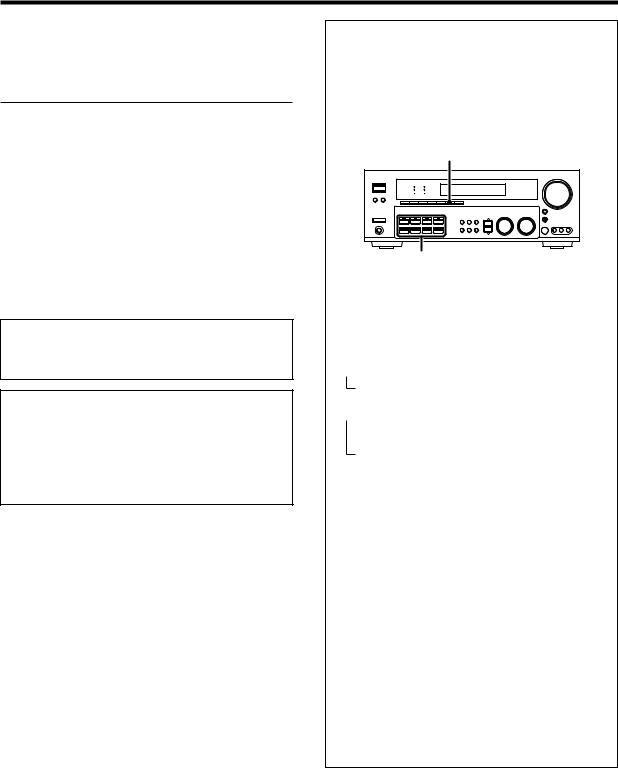
Setting up the system
Make connections as shown in the following pages.
When connecting the related system components, be sure to refer to the instruction manuals supplied with the components you are connecting.
Do not connect the power cord to a wall outlet until all connections are completed.
Notes
1.Be sure to insert all connection cords securely. If their connections are imperfect, sound may not be produced or there will be noise inference.
2.Be sure to remove the power cord from the AC outlet before plugging or unplugging any connection cords. Plugging/unplugging connection cords without disconnecting the power cord can cause malfunctions and may damage the unit.
3.Do not connect power cords from components whose power consumption is larger than what is indicated on the AC outlet at the rear of this unit.
Analog connections
Audio connections are made using RCA pin cords. These cables transfer stereo audio signal in an “analog” form. This means the audio signal corresponds to the actual audio of two channels. These cables usually have 2 plugs on each end, one red for the right channel and one white for the left channel. These cables are usually packed together with the source unit, or are available at your local electronics retailer.
Microcomputer malfunction
If operation is not possible or an erroneous display appears, even though all connections have been made properly, reset the microcomputer referring to “In case of difficulty”. ‚
CAUTION
Be sure to adhere to the following, or proper ventilation will be blocked causing damage or fire hazard.
•Do not place any objects impairing heat radiation onto the top of the unit.
•Leave some space around the unit (from the largest outside dimension including projection) equal to or greater than, shown below.
Top panel : 50 cm Side panel : 10 cm Back panel : 10 cm
Input mode settings
CD/DVD, VIDEO 2 and DVD/6CH inputs each include jacks for digital audio input and analog audio input.
The initial factory settings for audio signal playback for CD/DVD,
DVD/6CH and VIDEO 2 are full auto.
To use the analog audio input for playback instead (if, for example, you have connected a VCR to the VIDEO2 input), you must set the input mode for the corresponding input to the analog mode.
After completing connections and turning on the receiver, follow the steps below.
INPUT MODE
Input Selector
1Use the Input Selector keys to select CD/DVD, VIDEO 2 or DVD/6CH.
2Press the INPUT MODE key.
Each press switches the setting as follows:
In DTS play mode
 1 FULL AUTO (digital input, analog input) 2 DIGITAL MANUAL (digital input)
1 FULL AUTO (digital input, analog input) 2 DIGITAL MANUAL (digital input)
In CD/DVD, VIDEO 2, DVD/6CH play mode
 1 FULL AUTO (digital input, analog input) 2 DIGITAL MANUAL (digital input)
1 FULL AUTO (digital input, analog input) 2 DIGITAL MANUAL (digital input)
3 6CH INPUT (DVD/6CH input)
4 ANALOG (analog input)
Digital input:
Select this setting to play digital signals from a DVD, CD, or LD player.
Analog input:
Select this setting to play analog signals from a cassette deck, VCR, or record player.
Auto detect:
In “FULL AUTO” mode (AUTO DETECT indicator light up), the receiver detects the digital or analog input signals automatically. Priority is given to digital signal during input mode selection. The receiver will select the input mode and listening mode automatically during playback to match the type of input signal (Dolby Digital, PCM, DTS) and the speaker setting. The OPTICAL and COAXIAL indicator on the display will light up when digital signal is detected. If the input signal is analog, the ANALOG indicator will light up.
To keep the receiver set to the currently selected listening mode, use the INPUT MODE key to select “DIGITAL MANUAL” (manual sound). However, even when this setting is selected, there may be cases in which the listening mode is selected automatically to match a Dolby Digital source signal depending on the combination of listening mode and source signal.
If the INPUT MODE key is pressed quickly, sound may not be produced. Press the INPUT MODE key again.
9 EN
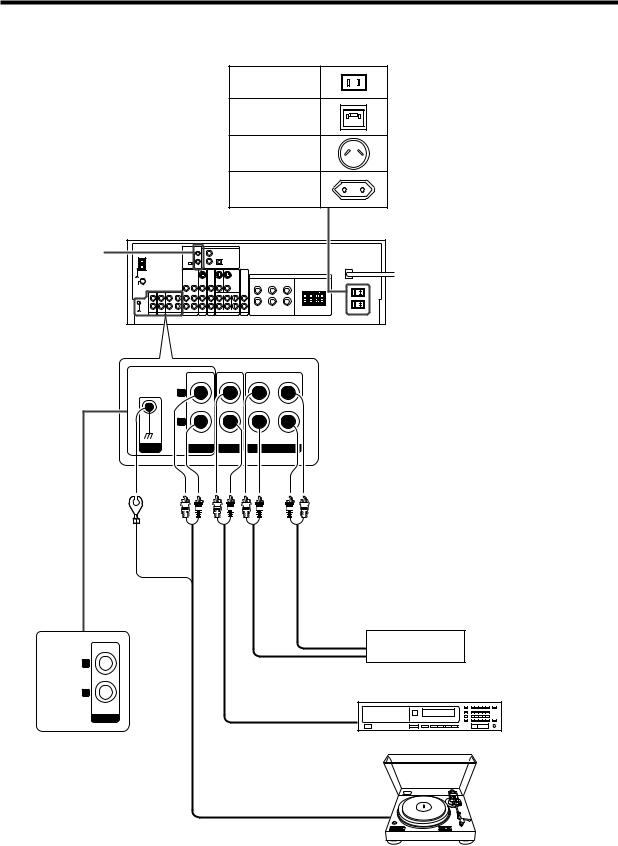
Setting up the system
Connecting audio components
Shape of AC outlets
U.S.A. and Canada
U.K.
Australia
Other countries
SYSTEM CONTROL
jacks &
To AC wall outlet
|
IN |
IN |
REC OUT PLAY IN |
|
L |
|
|
|
R |
|
|
GND |
PHONO |
CD/DVD |
MD/TAPE |
IN
L
R
AUX
[For VR-6050 and KRF-V6060D (except for the U.K.)]
OUT Cassette deck or
MD recorder
IN
OUT
CD or DVD player
OUT
Moving coil (MC) cartridge record player cannot be used directly from the receiver unit. It can only be used when another equalizer amplifier is connected.
Record player
10 EN
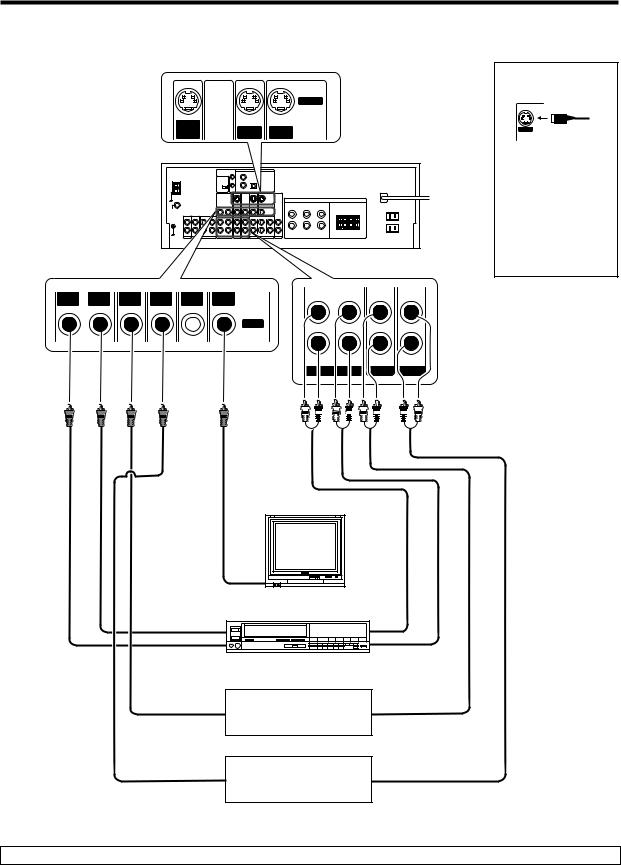
Setting up the system
Connecting video components
S Video jacks
S VIDEO
S VIDEO |
|
|
IN |
DVD |
MONITOR |
VIDEO |
IN |
OUT |
About the S VIDEO jacks
S VIDEO
Use the S VIDEO jacks to make connections to video components with S VIDEO IN/OUT jacks.
•If you use the S VIDEO jacks to connect your video playback components, be sure to use the S VIDEO jacks when connecting your monitor and video recording components.
VIDEO |
VIDEO |
IN |
VIDEO |
DVD |
MONITOR |
REC OUT PLAY IN |
PLAY IN |
PLAY IN |
OUT |
IN |
VIDEO |
IN |
IN |
OUT |
|
|
|
|
|
|
|
|
|
VIDEO |
|
|
|
|
|
|
|
|
VIDEO 1 |
VIDEO 2 |
VIDEO 3 |
Monitor TV |
|
VIDEO |
|
IN |
|
Video |
Audio |
IN/OUT |
IN/OUT |
Video inputs |
|
(Yellow RCA pin cords) |
|
Video deck |
IN |
OUT |
|
IN |
OUT |
Video inputs and outputs |
Audio inputs |
(Yellow RCA pin cords) |
and outputs |
OUT |
OUT |
DVD player or LD player |
|
OUT |
OUT |
DVD player or LD player |
|
A video component with digital audio outputs should be connected to the VIDEO 2 jacks.
11 EN
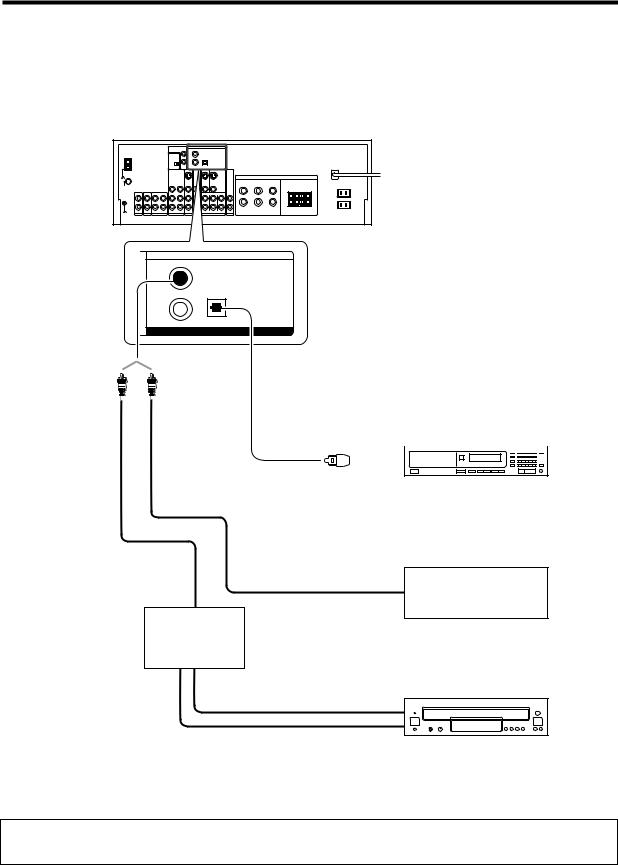
Setting up the system
Digital connections
The digital in jacks can accept DTS, Dolby Digital, or PCM signals. Connect components capable of outputting DTS, Dolby Digital, or standard PCM (CD)
format digital signals. |
|
If you have connected any digital components to the receiver, be sure to read the “Input mode settings” section carefully. |
9 |
COAXIAL OPTICAL
CD/DVD
VIDEO 2
DVD/
6CH
DIGITAL IN
COAXIAL DIGITAL OUT (AUDIO)
RF digital demodulator (DEM-9991D) (sold separately)
DOLBY DIGITAL RF
OUT (AUDIO)
Optical fiber OPTICAL DIGITAL OUT (AUDIO) cable 
CD or DVD player
COAXIAL DIGITAL OUT (AUDIO)
Component with DTS,
Dolby Digital, or PCM
COAXIAL DIGITAL OUT
Connect the video signal and analog audio signals to the VIDEO 2 jacks. (See “Connecting video components”.)
!
PCM OUT
LD player
To connect an LD player with a DIGITAL RF OUT, connect the LD player to the KENWOOD RF digital demodulator (DEM-9991D). Next, connect the DIGITAL OUT jacks of the demodulator to the DIGITAL IN jacks of the receiver.
Connect the video signal and analog audio signals to the VIDEO 2 jack. (See “Connecting video components”.)
12 EN
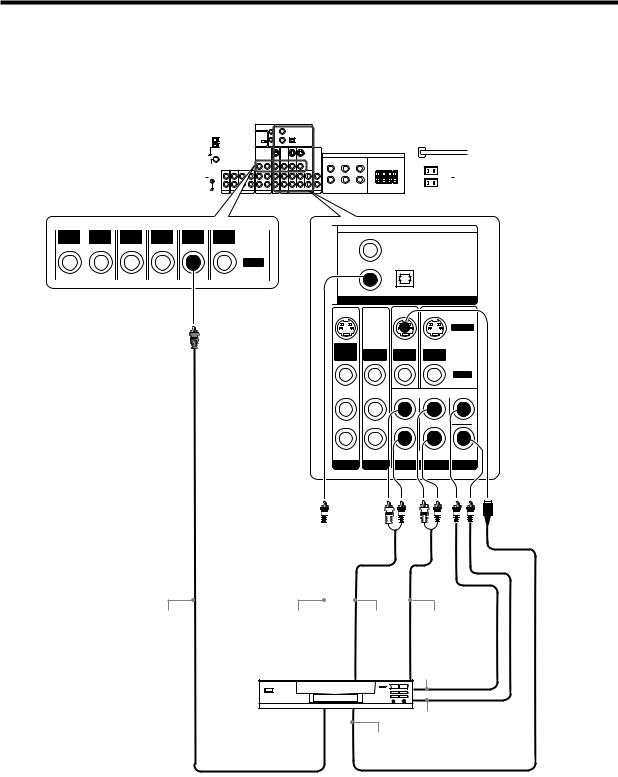
Setting up the system
Connecting a DVD player (6-channel input)
If you have connected a DVD player to the receiver with digital connection, be sure to read the “Input mode settings” section carefully. |
9 |
||||||||
|
|
|
|
|
|
|
|
|
|
|
|
|
|
|
|
|
|
|
|
|
|
|
|
|
|
|
|
|
|
|
|
|
|
|
|
|
|
|
|
|
|
|
|
|
|
|
|
|
|
|
|
|
|
|
|
|
|
|
|
|
|
|
|
|
|
|
|
|
|
VIDEO |
VIDEO |
IN |
VIDEO |
DVD |
MONITOR |
|
COAXIAL |
OPTICAL |
|
|
|
CD/DVD |
|
||||||
OUT |
IN |
VIDEO |
IN |
IN |
OUT |
|
|
|
|
VIDEO |
|
|
|
||||||
|
|
|
|
|
|
2 |
|
|
|
|
|
|
|
|
|
VIDEO |
|
|
|
|
|
|
|
|
|
DVD/ |
|
|
|
|
|
|
|
|
|
6CH |
|
|
|
|
|
|
|
|
|
|
|
DIGITAL IN |
|
|
|
|
|
|
|
|
|
|
S VIDEO |
|
|
|
|
|
|
S VIDEO |
|
|
|
|
|
|
|
|
|
IN |
VIDEO |
DVD |
MONITOR |
|
|
|
|
|
|
VIDEO |
IN |
IN |
OUT |
|
|
|
|
|
|
|
|
|
VIDEO |
|
|
|
|
|
|
PLAY IN |
PLAY IN |
|
CENTER |
|
FRONT SURROUND SUB WOOFER |
VIDEO 2 VIDEO 3 |
DVD/6CH INPUT |
VIDEO OUT |
COAXIAL |
FRONT |
SURROUND |
(Yellow RCA |
DIGITAL OUT |
OUT L/R |
OUT L/R |
pin cord) |
(AUDIO) |
|
|
|
DVD player |
|
CENTER |
|
|
OUT |
|
|
|
|
SUBWOOFER |
|
|
|
OUT |
|
|
S VIDEO |
|
|
|
OUT |
|
|
|
|
S VIDEO cord |
13 EN
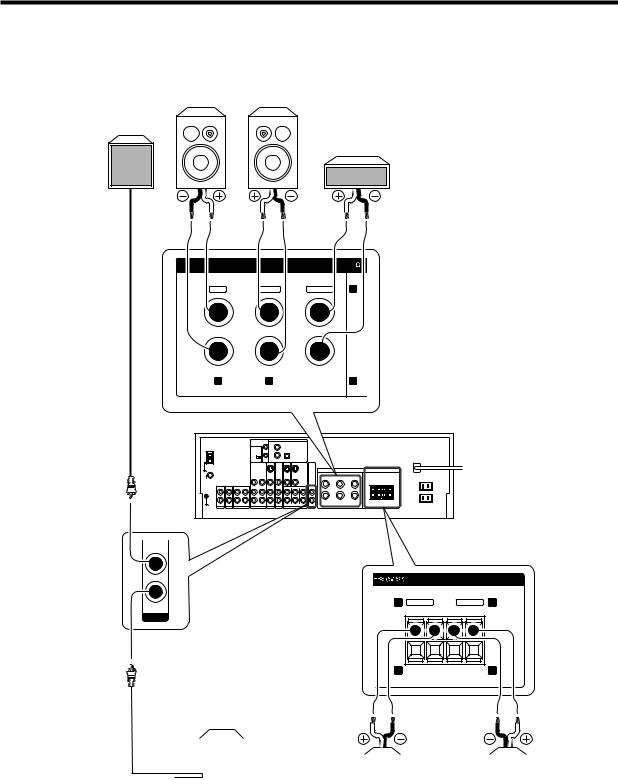
Setting up the system
Connecting the speakers
Front Speakers A
Right |
Left |
Powered
subwoofer
Center
Speaker
SPEAKERS (8-16 )
FRONT A |
|
CENTER |
|
RED |
WHITE |
GREEN |
R |
+
-
R L R
SUB WOOFER |
|
|
|
|
|
|
|
SURROUND |
|
|
|
R |
GRAY |
- |
- |
BLUE |
L |
SURROUND BACK |
+ |
+ |
|
||
PRE OUT |
|
|
|
|
|
R |
+ |
- |
- |
+ |
L |
|
|
FRONT B |
|
|
|
|
|
|
|
|
|
|
|
|
|
|
|
Power amplifier |
Surround |
|
|
|
Back |
|
|
|
|
|
|
|
|
|
Right |
Left |
|
Surround Speakers
(Be sure to connect both surround speakers)
Use the FRONT SPEAKERS B terminals if you want to connect a second front speaker system.
14 EN
